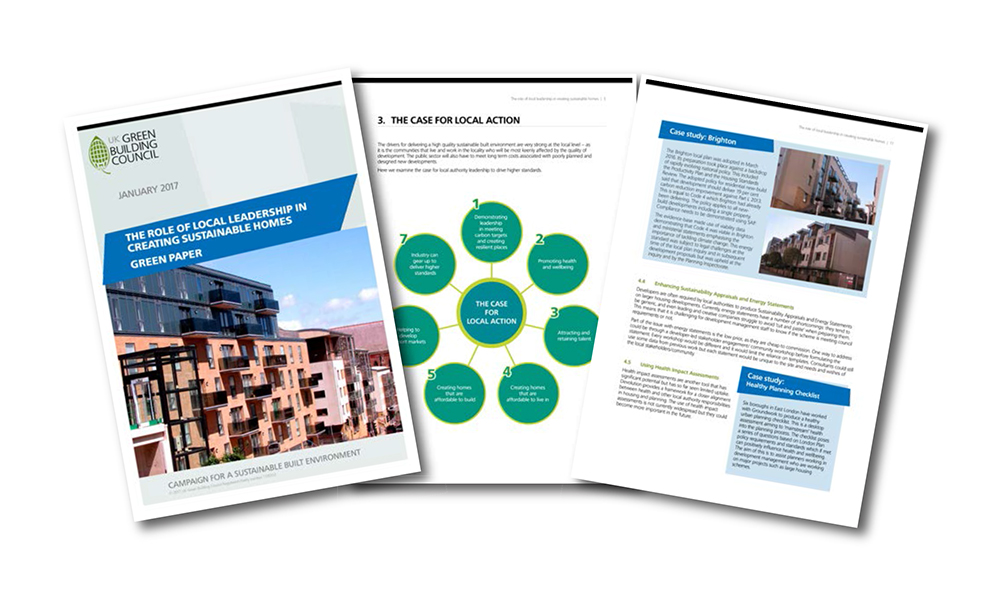
The UK Green Building Council has published its latest Green Paper — The Role of Local Leadership in Creating Sustainable Homes — proposing a key leadership role for cities and local authorities in supporting the delivery of sustainable new homes and communities.
The paper aims to stimulate debate and consultation by the public sector and industry. It considers how local authorities can work together with industry to raise the sustainability standards in new-build homes.
Local action
The UK Green Building Council (UK-GBC) says that experience overseas has shown that cities can be leaders on taking action on climate change. Examples of cities leading the way include: introducing higher building standards, running energy companies and introducing mandatory energy building labelling.
According to the paper, recent research from the Town and Country Planning Association found that the majority of new local plans in England are failing to cut carbon emissions and plan for the scale of severe weather predicted over future years. The findings show that 70% had no carbon reduction targets or anyway of monitoring their progress with carbon reduction.
Affordability is earmarked as one of the key areas that needs focusing on, the paper points out that money can be saved on energy and water bills through creating good quality homes. In terms of creating new affordable homes, it is argued that the key to reducing costs for the industry is for them to have certainty and consistency on the standards required, and for local authorities to avoid the use of very prescriptive requirements in preference for outcome based targets.
Local authority leadership
In researching for the paper, the UK-GBC says it found several key features that successful local authorities have in common: good leadership from the planning team, support from elected members and support from the chief executive. Support from the chief executive is seen as the key factor for the success of planning teams. It is advised that the planning performance agreement tool should be used as it can bring additional resources to deliver an enhanced planning service.
The paper puts forward the theory that there are strong links between environmentally sustainable and energy-efficient housing development and wider good designed principles. Clear thinking about the design and layout of a site can help support passive solar gain and onsite renewables whilst avoiding excessive overheating. Features such as swales and shelter belts can help manage water, promote biodiversity and indirectly assist in energy matters, minimising local urban heat island effects.
Neighbourhood planning is taken into consideration too; the Green Paper stating that local authorities can work with residents through neighbourhood planning. It advises that neighbourhood plans should not contradict local plans but can add to what is needed at local level and help bring forward smaller development sites.
Local authority as landowner
A diversity of tenures is recommended on larger sites for local authorities that retain an active role in the development process. The options include: self-build, custom build, community self-build, housing co-ops, community land trusts, and high quality build to rent. It argues that a wider range of tenure options can help address the needs of young professionals that would not be eligible for affordable housing but can’t access market housing.
The paper also advocates local authorities retaining control over its land to secure an ongoing revenue stream. Research in April 2015 suggested that 12% of local authorities in England already have a council-owned housing company. By November 2016 this figure had increased to over one third of all the councils in England, with activity focused mainly in London and the South-east. It cites the London Borough of Croydon as an example where it has a council-owned company called Brick by Brick which aims to build 1,000 new homes by 2019. These council-owned companies have borrowing powers independent of the council, and as well as addressing local housing problems, housing companies can provide a long-term form of supplementary revenue for councils.
Devolution opportunities
This chapter explores which powers city regions/combined authorities will be given through their devolution deals and which additional powers they could advocate for to gain greater control over the quality of new housing developments.
Spatial planning across a city region is put forward as an idea with multiple benefits including: moving away from one-size-fits-all national policies and being able to present forward looking, environmentally responsible and sustainable communities.
The UK-GBC also supports calls from Core Cities and other and other groups that have called for greater fiscal autonomy for cities. Other ideas advocated by Core Cities and others include the implementation of Tax Increment Financing that allows a local authority to trade anticipated future tax income for a present benefit, a model maybe worth exploring for the implementation of low carbon infrastructure.








